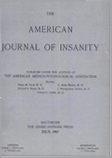SOCIAL DATA IN PSYCHIATRIC CASUALTIES IN THE ARMED SERVICES
Abstract
If five objective social factors (previous mental illness, broken homes, psychosis in the family, arrests and alcoholism) are studied in a group of military personnel who become psychotic it is significant that 72.2 per cent of them have one or more of these factors present and over 12.0 per cent have three to five of them (Table 7).
Of the 175 men rejected by Selective Service, if 42 cases of mental deficiency, epilepsy, organic disease of the central nervous system are excluded, there will remain 133 so-called "functional" cases. Of these 133 (63.0 per cent) displayed one or more of the factors we have mentioned. Of the 613 men accepted only 147 (24.0 per cent) had one or more of the factors.
It has been our experience that the use of the written questionnaire in obtaining even such simple data as we have described is of little value. Men deliberately tend to falsify in such a questionnaire, while a skilled interviewer whether he be a psychiatrist or not will be more likely to obtain correct information.
It is not implied that the presence of one or more of these factors should necessarily lead to disqualification although it is evident that a history of previous treatment for mental illness, or of frequent arrests or excessive alcoholism should be sufficient for [See Source Pdf for Table 7] rejection. The presence of a broken home or psychosis in the immediate family should point to a little more extended psychiatric inquiry than in the average case. It is our firm belief that social workers or trained volunteers could be utilized to great advantage to obtain this information, as well as data about education, convulsions and enuresis, before a man is examined. Where these data are positive it would furnish leads for the psychiatrist.
Access content
To read the fulltext, please use one of the options below to sign in or purchase access.- Personal login
- Institutional Login
- Sign in via OpenAthens
- Register for access
-
Please login/register if you wish to pair your device and check access availability.
Not a subscriber?
PsychiatryOnline subscription options offer access to the DSM-5 library, books, journals, CME, and patient resources. This all-in-one virtual library provides psychiatrists and mental health professionals with key resources for diagnosis, treatment, research, and professional development.
Need more help? PsychiatryOnline Customer Service may be reached by emailing [email protected] or by calling 800-368-5777 (in the U.S.) or 703-907-7322 (outside the U.S.).



